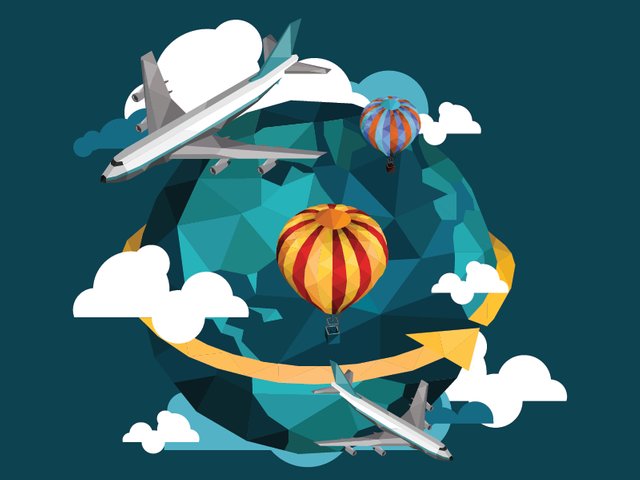The Exciting New Age of Decentralized Societies is On The Horizon

As the price of cryptocurrencies (Steem, included!) continues to rise we as the front of this movement need to consider what comes next.
The Age of Distributed Apps
The age of distributed apps (Dapps) represents a new epoch in human progress. In the past, organizations, institutions, and States were based largely on real estate and defined by a physical border.
That's going to change, and sooner rather than later.
Dapps created on blockchains like Ethereum and EOS (at the moment EOS or something like it seems far more likely) are making it so that you can create organizations of arbitrary complexity and scale. That means that basically almost any entity that you can think of that is currently centralized is likely to one day have a decentralized alternative. In other words we are soon going to see the first major decentralized companies, projects, and decentralized, borderless nations. I've actually made up a term for this that I hope becomes popular: world nation.
The Rise of World Nations
We've already seen proto world nations, though they aren't really taken seriously at the moment. Two examples of such entities are Asguardia and Bitnation. Asguardia is basically a small hard drive that was launched into space, but it's referred to itself as the first space society. Bitnation is more along the lines of what I'm referring to here, calling itself a decentralized nation. However, it's pretty simplistic at the moment, and doesn't provide everything that you'd expect a full autonomous state to have.
Another glaringly obvious example is actually literally right in front of your nose as you read this: Steemit itself (and other Steem apps).
You might argue that, in that case, even Facebook would count as a borderless society, but there are some important differences. Steemit has its own currency, voting that has a effect (witnesses and also posts), and is self governed. This makes it, in my opinion, much closer to a world nation than Facebook. Thus I confidently place it amongst my listed proto world nations (borderless states).
Ray Kurzweil, famed futurist with an over 80% accuracy rate for his predictions, predicted in his 2005 book The Singularity is Near that by 2020 there would be a new world government.
This is one of the predictions that I seriously doubted. Now, I don't see how it wouldn't happen. People are sick and tired of our incompetent, tyrannical governments pushing us around, taking our money (and either wasting, misspending, pocketing, or leveraging it for their own personal gain), monitoring us, and on the whole trying to hide it all. It's like a child who swears he didn't steal any cookies from the jar, but chocolate is smeared on his fingertips and crumbs are smattered around his shamelessly smiling lips.
Central Problems, Decentralized Solutions
People want transparency. They want an end to pretty politics and state aggression both towards individuals and towards other states. Borderless societies probably don't hold all the answers (a weakness is that I see difficulty in protecting an individual from other, malignant individual(s) - among others), but it's difficult not to believe that they could be a significant step forward.
These cryptocurrencies, these tokens, they all stand for something. People are attracted right now because of the hype, but soon they will come to realize that cryptocurrencies are inherently more meaningful, and in general better at embodying ideas than fiat currencies.
When you invest your time or money into any given crypto, you are really investing in what that crypto represents. It doesn't matter if you care about that idea (i.e., you're only in it to make a buck) you are still propagating that idea nonetheless.
This is true even for Bitcoin.
Value Backed By Values
It can be argued that people who invest in Bitcoin are really investing in the idea of crypto, inherently making all other crypto more valuable. In this sense you can think of Bitcoin as an ideological gold standard for crypto. In this way all crypto is helped by bitcoins' inherently deflationary nature. Indeed, the first widespread crypto probably had to be deflationary and exclusive in order to build the required hype. It's hard to say, but perhaps Satoshi Nakamoto realized even this.
It's clear that real freedom won't happen, even in these decentralized organizations and States, until the internet itself (or at the very least ownership and maintenance of it) is decentralized or has several decentralized alternatives. That's when I realized: this is what's coming next - maybe even in the next year or so depending.
Future Promise and Peril
It's an exciting time, but sort of scary, too. There's real potential to make things better for everyone world wide, but it's not like it's impossible that it could go the opposite way. We could accidentally create a system that's far more tyrannical than the current ones in existence. Or, governments and central institutions like banks could actually manage to sell people on a faux decentralized solution of their own creation (several countries and companies/banks have already shown an interest). I doubt these things will happen, but my point is that we must be vigilant.
Decentralization certainly won't solve everything: we're learning that here on Steemit. But it must be said, considering how new the technology is in it's widely adopted form, the future looks very bright and even more interesting.

Friday, December 8th, 2017
Source: 1
This post has received a 1.58 % upvote from @buildawhale thanks to: @jenkinrocket. Send at least 1 SBD to @buildawhale with a post link in the memo field for a portion of the next vote.
To support our daily curation initiative, please vote on my owner, @themarkymark, as a Steem Witness
This post has received a 4.64 % upvote from @sneaky-ninja thanks to: @jenkinrocket.
Here's a question, though: if real freedom doesn't happen until the Internet is decentralized...where's the centralization of the Internet itself?
As far as I can tell, there is no ownership of the Internet at large. There are huge entities (coughGooglecough) out there buying up big swaths of the real estate, but it's still almost impossible even in ultra-heavy-handed places like China to completely own, maintain or regulate the communication medium that is the Internet itself. So from that definition, we already have freedom and do not need to invent an alternative. The alternatives we need to have would revolve around getting us out of the Google-type traps where all our interaction with others is actually happening within the regulatory eyes of a company.
Also, the idea of a borderless world nation is a pretty old one and there are a couple of long-held problems that appear even here on Steemit: 1.) cultural differences ultimately make us most comfortable interacting with those who belong or at least mostly understand the cultural place we come from, creating automatic barriers; and 2.) good fences really do make good neighbors.
Thanks for the thoughtful article, as always! I curate for Build-a-Whale and am always happy to see your name show up in the list.
Your post had been curated by the @buildawhale team and mentioned here:
https://steemit.com/buildawhale/@buildawhale/buildawhale-curation-digest-12-14-17
You have received a Whaleshare Token upvote by the account @officialfuzzy thanks to the whaleshares community and @buildawhale
Keep up the good work and original content, everyone appreciates it!